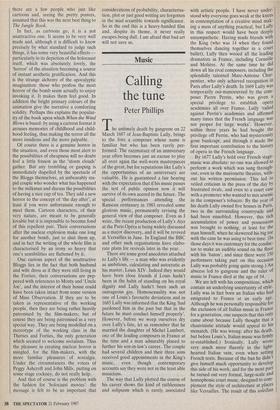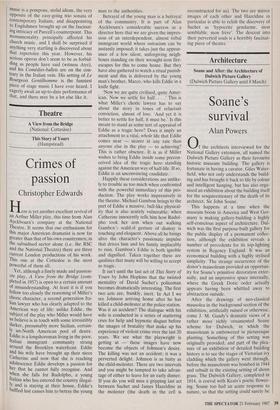Music
Calling the tune
Peter Phillips
The untimely death by gangrene on 22 March 1687 of Jean-Baptiste Lully, brings to the fore a composer whose name is familiar but who has been rarely per- formed. The razzmatazz of an anniversary year often becomes just an excuse to play all over again the well-worn masterpieces of the great; but for reputations like Lully's the opportunities of an anniversary are valuable. He is guaranteed a fair hearing with the expectation that if his music passes the test of public opinion now it will survive of its own accord in the future. The special performances attending the Rameau centenary in 1983 revealed some glorious music, permanently revising the general view of that composer. Even as I write, the recent production of Lully's Atys at the Paris Opera is being widely discussed as a major discovery, and it will be revived at Versailles in June. In England the BBC and other such organisations have elabo- rate plans for revivals later in the year.
There are some good anecdotes attached to Lully's life — a man who was evidently as ambitious, calculating and autocratic as his master, Louis XIV. Indeed they would have been close friends if Louis hadn't been in the habit of standing on his royal dignity and Lully hadn't been such an outrageous gay. Homosexuality was not one of Louis's favourite deviations and in 1685 Lully was informed that the King 'had pardoned him in the past but that in the future he must conduct himself properly'. However, before we weep ourselves dry over Lully's fate, let us remember that he married the daughter of Michel Lambert, one of the leading composers in France at the time and a man admirably placed to further his son-in-law's career. The couple had several children and their three sons received good appointments in the King's music, even though contemporary accounts say they were not in the least able musicians.
The way that Lully plotted the course of his career shows the kind of ruthlessness and solipsism which is rarely associated with artistic people. I have never under- stood why everyone goes weak at the knees in contemplation of a creative mind mak- ing a mess of anything practical, but Lully in this respect would have been deeply unsympathetic. Having made friends with the King (who was 14 when they found themselves dancing together in a court ballet), Lully then wooed all the leading dramatists in France, including Corneille and Moliere. At the same time he did down all his rival composers, including the splendidly talented Marc-Antoine Char- pentier, who only achieved recognition in Paris after Lully's death. In 1669 Lully was temporarily out-manoeuvred by the com- poser Pierre Perrin, who was given a special privilege to establish opera academies all over France. Lully 'railed against Perrin's academies and affirmed many times that the French language was not proper for large works'. However, within three years he had bought the privilege off Perrin, who had mysteriously gone bankrupt, and through it made the first important contribution to the history of opera in the French language.
By 1677 Lully's hold over French stage- , music was absolute: no one was allowed to perform a work which was sung through- out, even in the marionette theatres, with- out his written permission. This led to veiled criticism in the press of the day by frustrated rivals, and even to a court case with a promoter who wanted to mix arsenic in the composer's tobacco. By the year of his death Lully owned five houses in Paris, two in the surrounding countryside and had been ennobled. However, this rich accumulation of power and possessions was brought to nothing, at least for the man himself, when he skewered his big toe with the cane he was using to beat time. (In those days it was customary for the conduc- tor to make an audible sound on the floor with his 'baton', and since there were 150 performers taking part on this occasion Lully was probably going quite strong.) An abscess led to gangrene and the ruler of music in France died at the age of 54. We are left with his compositions, which contain an underlying uncertainty of style. Lully was in fact born an Italian who had emigrated to France at an early age. Although he was personally responsible for the exclusion of all Italian music in France for a generation, one suspects that this only came about because Lully thought that a chauvinistic attitude would appeal to his monarch. (He was wrong: after his death, but before Louis's, Italian music was firmlY re-established.) Ironically, Lully wrote very much more fluently in the light- hearted Italian vein, even when setting French texts. Because of the ban he didn't give himself much opportunity to develop this side of his work, and for the most part he turned out very formal, large-scale and homophonic court music, designed to com- plement the style of architecture at places like Versailles. The result of this soleilian music is a pompous, stolid idiom, the very opposite of the easy-going trio sonata of contemporary Italians, and disappointing to Englishmen brought up on the fascinat- ing intricacy of Purcell's counterpoint. This monumentality principally affected his church music, and I shall be surprised if anything very startling is discovered about that repertoire this year. However, his serious operas don't seem to be as forbid- ding as people have said (witness Atys), and his Comedies-ballets are on the con- trary in the Italian vein. His setting of Le Bourgeois Gentilhomme is the funniest piece of stage music I have ever heard. I eagerly await an up-to-date performance of that, and there may be a lot else like it.



















































 Previous page
Previous page